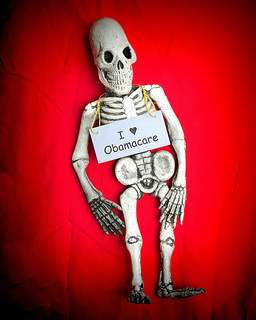Obamacare Advisor Caught In His Own Video of Lies
- OurStudio

- Jul 30, 2014
- 3 min read

: joels_photos1 / Foter / Creative Commons
When a three-judge DC Circuit Court panel agreed with the plaintiffs in Halbig v Sebelius, the most potent legal challenge to Obamacare, the law's supporters went ballistic. The lawsuit challenged the legality of the subsidies that the administration was handing out through federal exchanges in 34 states. It argued that these subsidies were illegal because Obamacare had explicitly limited them to state-run exchanges.
The New Republic's Brian Beutler wrote that the judges had validated a claim that even the "people advancing it realize is false." University of Chicago health care expert Harold Pollack denounced the ruling as "judicial activism" that ignored the plain intent of Congress.
Above all, there was MIT economist Jonathan Gruber, one of the key architect's of the law whom the administration paid $400,000 in consultation fees. He had previously claimed the plaintiff's theory was based on a "screwy interpretation of the law."
And when the ruling came, he went on MSNBC's Chris Matthews to flesh that out. Barring the feds from handing subsidies, he explained, would mean that "99 percent of the people would no longer be able to afford insurance," something that would gut Obamacare's individual mandate. "Why would Congress set up the mandate and go through all that political battle to allow it to be destroyed?" he asked. "It`s just simply a typo, and it`s really criminal that this has even made it as far as it has."
But Gruber was singing a very different tune in a 2012 speech before Halbig was filed.
In a video that surfaced last Thursday night, Gruber noted:
What's important to remember politically about this is if you're a state and you don't set up an exchange, that means your citizens don't get their tax credits… I hope that that's a blatant enough political reality that states will get their act together and realize there are billions of dollars at stake here in setting up these exchanges.
In other words, Congress did mean to use the subsidies to overcome the resistance of states and pressure them to set up their own exchanges. That is precisely what the plaintiffs in Halbig asserted. Of course, Obamacare's supporters didn't anticipate that the backlash against the law would be so intense that 34 states would actually decline the subsidies, almost as an act of civil disobedience.
On Friday morning, an embarrassed Gruber insisted to The New Republic's Jonathan Cohn, "I honestly don't remember why I said that… I was speaking off-the-cuff. It was just a mistake."
But a second speech, this time in the form of audio, then surfaced in which he makes the same claims before the Jewish Community Center of San Francisco at around the same time. In it, Gruber actively acknowledges that should states revolt en masse, they'd bring down the law. But, he said, that he had enough faith in democracy to believe that even the states that didn't like Obamacare would eventually succumb to the "ultimate threat" that "if your governor doesn't set up an exchange, you are losing hundreds of millions of dollars in tax credits to be delivered to your citizens."
Gruber would like everyone to ignore, not just the plain text of a law that he had a major hand in crafting, but also the plain meaning of his own words explaining why the law was written the way it was—not once, but at least twice.
Talk about being "screwy" and "really criminal!"
This piece originally appeared in the USA Today




Comments